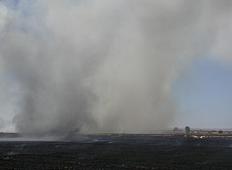 Natural Resource Report News Note:
Natural Resource Report News Note:
Oregon’s new stricter field burning ban goes into effect this summer. Last year 50,000 acres were burned and this year it will be down to 15,000 acres for certain areas. The state had to deny over 3,500 acres of burn requests due to the new ban.
Oversight of the burns goes to the smoke management Division of the Oregon Department of Agriculture. This division is funded by registration fees. The Democrat Herald reports that the continuing drop in burns the division has seen their staff cut in half with some responsibilities outsourced. The new 2009 law is phasing out most field burning in the Willamette Valley. Stack burning and propane flaming will be completely banned by 2013. DEQ took testimony in April, and extended it into May. Grass seed farmers testified on the rules last year that the ban would drive many farmers out of business.
There are exceptions for hardships and emergencies under certain conditions, but farmers say it is not realistic.
The Register Guard highlighted the problems faced by alocal grass seed farmer George Pugh;
“In the south valley, George Pugh, a farmer who helped shape the proposed new rules, said the emergency burn provisions are so restrictive that no pest outbreak on an Oregon grass seed farm would be severe enough to qualify for a burn permit. “You have to prove a high level of economic distress. It’s just too big of a hurdle. I really do not expect to see it used,” said Pugh, a Shedd grass seed farmer.
Farmers will be left without fire as a tool to fight the crop-damaging ergot, blind seed disease and annual blue grass weed invasions, he lamented. Annual blue grass — called Poa annua by the farmers — has been a particular problem for Pugh. The grass invades his annual rye grass crop, and he ends up harvesting some blue grass seed along with the rye grass seed crop. If there’s enough contamination by blue grass seed, he can’t sell the crop.
Before the burn ban, “when it got bad enough, we would come in with fire and it would get us back to the place where we could still produce a marketable crop,” Pugh said. Now, he said, he’ll look for other crops to rotate through those fields — such as white clover, meadow foam and vegetable seed plants — to try to displace the blue grass. “It may get to be so big of a problem that a farmer doesn’t have a whole lot of hope,” Pugh said.”
Disclaimer: Articles featured on Oregon Report are the creation, responsibility and opinion of the authoring individual or organization which is featured at the top of every article.

